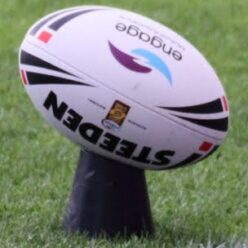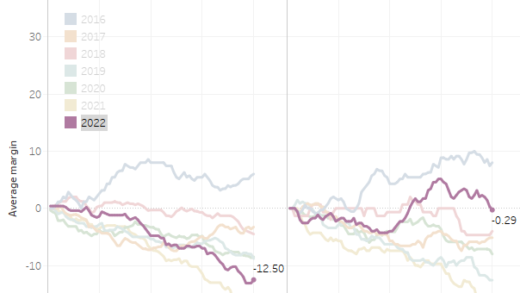This article was originally posted as part of NRL Round 9 notes and trends, July 14, 2020.
In last weeks trends and notes post, I showed there was a negative correlation between set restarts and margin, which had been positive from Round 3 to Round 7. With another week of matches completed, I thought I’d dig a bit deeper into this to see if I could find out what was leading to this.
The reason I find this so interesting is that it doesn’t conform with traditional rugby league thinking. Possession is treasured, and statistics like run metres correlate with winning games (keep in mind correlation doesn’t equal causation). Yet by giving away more set restarts, you’re giving possession and therefore more metres to the opposition. Surely that would result in giving up more points?
Looking at net margin plotted against net set restarts after Round 9 shows a similar chart to last round. I’ve named the quadrants as well to make it easier to identify what the chart is showing and the bigger the dot the more set restarts conceded.

As with last week it appears that “winning” the set restart count is inconsequential, with only two teams having any significant net margin despite coming out ahead with set restarts. The top left quadrant – “Conceding and winning” – is the one I want to focus on though, given the makeup of teams within that area.
Last week there was only one top four side in that top left quadrant, which was the Panthers. This week they’re joined by the other top four sides – Melbourne, Parramatta, and the Roosters – indicating that giving away set restarts is a genuine part of their strategy. And that is only counting the set restarts given, not intentional slowing down of the ruck that isn’t called.
The Panthers are a curious case. Penrith not only have the largest difference between set restarts conceded and awarded at -23, they have also conceded the most in the NRL at 43 and been awarded the fewest at 20.
I noted last week that the only time they’ve come out ahead in set restart differential (Round 6 against the Eels), they lost by 6. This continued in Round Nine, with Penrith conceding three more set restarts than Cronulla, yet still beating them by 32 points.
In addition to the Panthers, among the other top four sides, the Roosters have the second fewest restarts awarded (23), the Storm are third fewest (24), while the Eels sit seventh (27).
With the limitations on publicly available data it’s hard to see exactly why they’re benefiting from these restarts, but we can use what is available to craft some ideas. One theory is that the early set restarts that are in vogue help the defensive team get set, limit chances for the team with the ball to gain momentum and exploit any breaks in their line.
A way of quantifying this is could be by examining the amount of runs under and over 8 metres conceded against the raw number of set restarts. As a team concedes more set restarts, there is a small positive correlation with runs shorter than 8 metres conceded (top of chart below), and a small negative correlation with runs longer than 8 metres (bottom of chart below).

Given this correlation, you could assume that the more set restarts you concede, the more likely you are to give up shorter, ineffective runs than longer more damaging runs.
This makes sense – giving up a set restart on the first or second tackle on your opponent’s 20m line and contain them within their own half is preferable to allowing them to string together a number of longer runs and push into your territory for an attacking kick or set piece. It also enables teams to maintain a defensive structure and limit any gains from broken play.
Examining when set restarts are given and the outcome of the consequent set compared to the average set would show if this is successful or not, but again we’re limited by publicly available data.
On the other end of the scale, the Bulldogs position on this chart is just another sad indictment on their run under former coach Dean Pay. They play a very conservative brand of football, limiting defensive mistakes and (attempting to) maintain possession and complete sets. As much as he has been able to get his players to show up every week under trying circumstances, this style of play hasn’t yielded any results and the constant switching of combinations appears to be actively hurting their performances. And let’s not even talk about the Queensland sides.
I’m not arguing that conceding another set of six to their opponent is the reason that the top four sides are sitting where they are. But there is something in the new ruleset for rugby league that is widening the gap between the haves and have nots.
At a surface level there’s a minor increase in win percentage if you lose a set restart count. Removing drawn games and even set restart counts, teams who had a negative set restart differential have won 56% of their games this season. In Round 9, six of the eight games were won by teams with a negative set restart differential. The only teams that won with a positive set restart differential on the weekend were Souths and St George Illawarra.
Conceding more set restarts to your opponent isn’t going to win or lose games for you, but strategically conceding them appears to be part of the game plan for the successful clubs in 2020.


